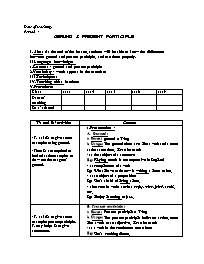Ôn tập môn Tiếng Anh khối 11 - Period 4: Gerund & present participle

I. Aim: At the end of the lesson, students will be able to know the differences between gerund and present participle, and use them properly.
II.Language knowledge:
1.Grammar: gerund and present participle
2.Vocabulary: words appear in the exercises
III.Techniques:
IV.Teaching aids: handouts
V.Procedure:
Bạn đang xem tài liệu "Ôn tập môn Tiếng Anh khối 11 - Period 4: Gerund & present participle", để tải tài liệu gốc về máy bạn click vào nút DOWNLOAD ở trên
Date of teaching: Period: 4 GERUND & PRESENT PARTICIPLE I. Aim: At the end of the lesson, students will be able to know the differences between gerund and present participle, and use them properly. II.Language knowledge: 1.Grammar: gerund and present participle 2.Vocabulary: words appear in the exercises III.Techniques: IV.Teaching aids: handouts V.Procedure: Class 11a1 11a4 11a5 11a6 11a9 Date of teaching Sts s’ adsend T’s and Ss’ activities Content - T. asks Ss to give some examples using gerund. - Then Ss are required to looked at the examples to draw out the usage of gerund. 1.Presentation: A. Gerund: a. Form: gerund = V-ing b. Usage: The gerund often acts like a verb and a noun at the same time. It can be used: - as the subject of a sentence Eg: Playing tennis is not expensive in England - as complement of a verb Eg: What I have to do now is writing a letter to her. - as an object of a preposition Eg: She’s afraid of living alone. - after certain verbs such as enjoy, miss, finish, avoid, etc. Eg: I enjoy listening to jazz. - T. asks Ss to give some examples present participle. T. may helps Ss to give some more. - Then Ss are required to looked at the examples to draw out the usage of present participle. B. Present participle: a. Form: Present participle = V-ing b. Usage: The present participle indicates action, more like a verb or an adjective. It can be used: - as a verb in the continuous tense form Eg: She’s cooking dinner. - as an adjective Eg: It’s an interesting story. - to replace a relative clause Eg: The man (who is) standing next to the door is my father. - to replace subject + verb in the main or subordinate clauses Eg: Entering the room, I saw him. - after some verbs like catch, find, leave, etc + someone Eg: I caught him climbing the fence. Don’t leave her waiting outside in the rain. - after some verbs such as waste, spend, go, be busy, ect Eg: You waste too much time copying the lesson again. It’s very hot today. Let’s go swimming. - after some verbs of perception such as see, hear, watch, smell, feel, observe, notice, etc Eg: I heard him coming into the hall. - Ss work in pairs to do the exercise. - T. calls on some Ss to read their answers, and correct their answers if necessary. 2.Practice: Put the verbs in brackets into the correct verb form (gerund, present participle, infinitive): We will go (camp) . in BaDen mountain this summer vacation. That’s such an (amuse) .. story that I can’t put it down. (take) .. the umbrella with him, he went out in the heavy rain. I have to work hard these days. I am always busy (do) .. my home work. Would you like to go (fish) .. with me on Saturday afternoon? It was one of my most (embarrass) .. experiences in my life. That he passed the exam is very (surprise) .. The woman (wear) .. a red dress is my neighbor. We spend most of my time (read) .. science book. The film is very (bore) So I kept on sleeping in the rex. I didn’t like (work) so I suggested (spend) the day in the garden. I’d rather (go) for a swim then (play) tennis. We’d better (study) hard. Why do you keep (look) back? Are you afraid of (be) followed? ( write) gives him a lot of pleasure. Does your sister mind (cook) everyday? Have you ever considered (go) to live in another country? He tried to avoid (answer) my questions. When I’m tired, I enjoy (watch) TV. It’s relaxing. The movie was very sad. It made me (cry) I’ll do the shopping when I’ve finished (clean) the apartment. Paula has given up (try) to lose weight. When I was a child, I hated (go) to bed early. Would you like (come) to dinner on Friday? He left the hotel without (pay) his bill. Are you looking forward to (see) Ann again? After (find) a hotel, we looked for someplace to have dinner. It took us three hours (get) here. I’d rather (go) (shop) than anything else. My close friend is fond of (sew) I was very tired. I tried (keep) my eyes open, but I couldn’t. She told me (lock) the door. My father allowed me (use) the camera. It was a nice day, so we decided (go) for a picnic. They jog every morning (lose) weight and (have) a good health. She is busy (feed) the baby all the time. Would you mind my (smoke) here? He doesn’t let anyone (talk) in the working time. 39. Most people prefer (spend) money to (earn) it. 40.Susan wants (go) to Hanoi next week. - T. sets homework. - Ss do the task at home. 3. Homework: Revise today’s lesson. Do all the exercises again. Comments:
Tài liệu đính kèm:
 period 4.docx
period 4.docx





